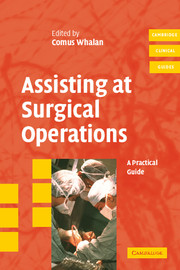Book contents
- Frontmatter
- Contents
- Contributors
- Foreword
- Preface
- PART I Introduction to the operating theatre
- 1 General conduct in the operating theatre
- 2 Universal Precautions
- 3 Clothing in the operating theatre
- 4 Personnel: who's who in the operating theatre
- PART II The operation itself
- PART III Assisting at special types of surgery
- PART IV Immediately after the operation
- Glossary
- Suggested further reading
- References
- Index
1 - General conduct in the operating theatre
Published online by Cambridge University Press: 18 December 2009
- Frontmatter
- Contents
- Contributors
- Foreword
- Preface
- PART I Introduction to the operating theatre
- 1 General conduct in the operating theatre
- 2 Universal Precautions
- 3 Clothing in the operating theatre
- 4 Personnel: who's who in the operating theatre
- PART II The operation itself
- PART III Assisting at special types of surgery
- PART IV Immediately after the operation
- Glossary
- Suggested further reading
- References
- Index
Summary
Relationship with theatre staff
Just like people anywhere else, theatre staff will usually react favourably to being treated like human beings instead of automatons. Like most normal people, if you are kind to them, they will help you. Often they teach you useful things about the operating theatre, which surgeons do not know. Just about everyone in an operating theatre is expert at something. Even the unassuming theatre orderlies usually know quite a lot about the various machines in the theatre. They are sometimes the only people who can fathom the mysteries of obscure operating table functions.
The words ‘please’ and ‘thank you’ are not commonly used during operations. This is not because surgeons have an abrupt, impolite manner (although unfortunately, some of them do), but rather because it eliminates words that may be mis–heard, and so makes a request easier to understand. That said, simple politeness seldom annoys people, so it is not wrong to say ‘please’ and ‘thank you’ if you speak clearly.
If you are on your first trip to the operating theatre, you may feel unsure about how to do some apparently simple things. In this case, the best thing to do is simply ask for advice from an experienced staff member. This particularly applies to scrubbing, gowning and gloving (see p. 36–42). You may be proud of the fact that you are already capable of washing your hands and dressing yourself unaided. However, these seemingly simple acts are done in the operating theatre in ways that vary subtly but importantly from the way they are done elsewhere. You will almost certainly do them wrongly the first time, if you do not ask someone to supervise you.
- Type
- Chapter
- Information
- Assisting at Surgical OperationsA Practical Guide, pp. 3 - 8Publisher: Cambridge University PressPrint publication year: 2006

